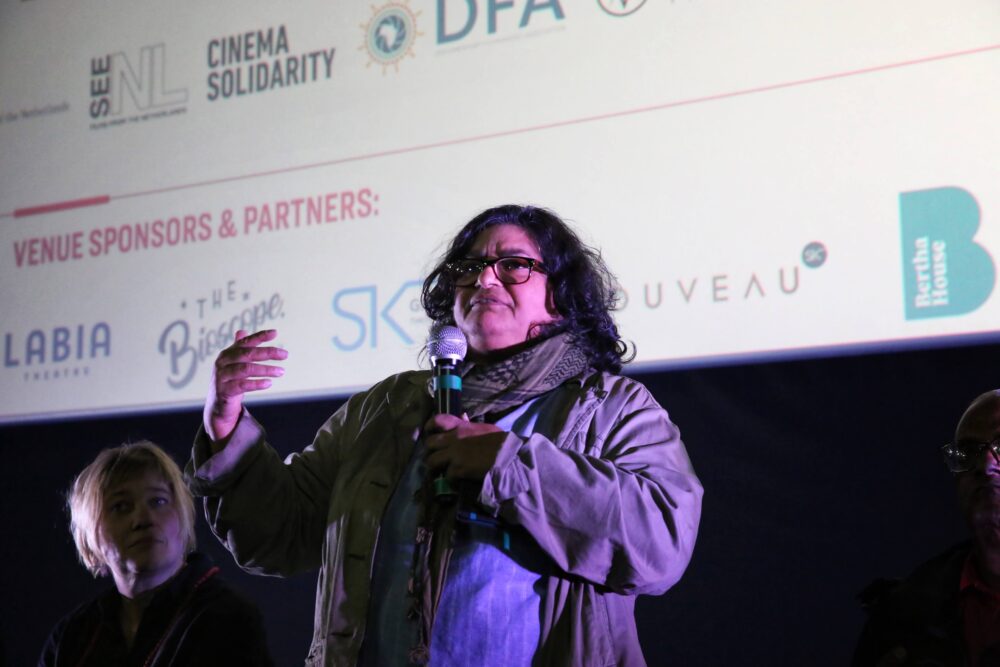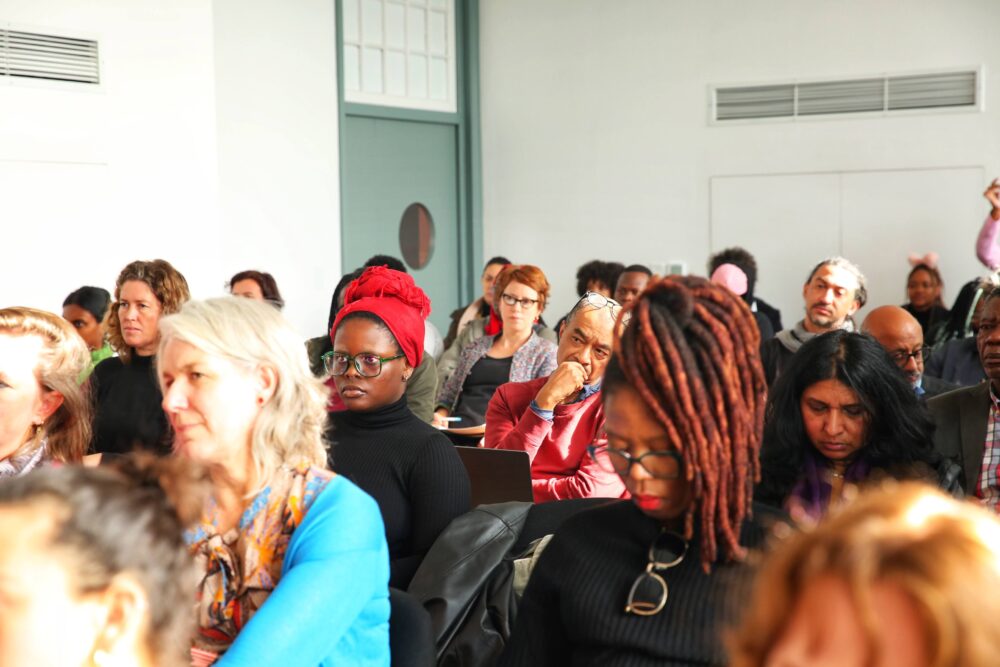Reel impact: Encounters director Mandisa Zitha. Photo: Shunyu Gu
What makes a great documentary? It’s a deceptively simple question — one that has been floating around my mind for a while.
When I put it to Mandisa Zitha, the long-serving director of the Encounters South African International Documentary Festival, she responds without hesitation: “I watch a lot of documentaries for my work; a lot, for months,” she says with a soft laugh. “But I can say, for me, personally, a good documentary is able to move me from where I am now to somewhere else.”
That “somewhere else” could be emotional, intellectual, spiritual.
Zitha describes the best documentaries as those that “shift you in a particular way, whether it’s a mindset shift or creating awareness or having an emotional impact.”
It’s not about production budgets or running time. It’s about transformation. That response resonates deeply with me, as a writer. I tell Zitha that I’ve always believed that good books make you think, but great books change the way you think, and that surely, the same must be true for great documentaries.
She agrees. And it’s that kind of storytelling — the kind that lingers, that challenges, that awakens — that Zitha and her team have consistently sought to showcase during her 11 years at the helm of Encounters.
Now in its 27th edition, the festival returns this month with a slate of powerful films screening in Cape Town and Johannesburg.
And while Zitha resists picking favourites, she does offer a few highlights to look out for, including films that explore both familiar histories and lesser-known legacies.
One such title is Sam Nzima: A Journey Through His Lens, which comes to screens not long after the June 16 holiday.
The film revisits the iconic image of 12-year-old Hector Pieterson’s lifeless body, captured by Nzima during the 1976 Soweto Uprising. But it’s not just about the photo: “It’s the story behind the photograph and the story of the photographer,” Zitha explains. “It really speaks to the theme of art and impact.”
 District Six Museum Homecoming Centre’s Mandy Sanger at a previous festival. Photo: Shunyu Gui
District Six Museum Homecoming Centre’s Mandy Sanger at a previous festival. Photo: Shunyu Gui
Also fitting that theme is Anselm, a stunning 3D documentary by acclaimed German filmmaker Wim Wenders, exploring the life and work of visual artist Anselm Kiefer.
“It’s a cinematic pleasure,” says Zitha. “You just immerse yourself in the cinematography and the art.”
Closer to home, Matabeleland by Zimbabwean filmmaker Nyasha Kadandara promises to strike a chord with South African audiences, particularly the large diaspora.
The film explores the long shadow of the Gukurahundi massacres, which saw thousands killed during Robert Mugabe’s early years in power.
Told through the eyes of a young man grappling with the disappearance of his father, the film weaves together personal loss, ancestral reckoning and the complexities of a life between two countries.
“It’s about people living with double lives and unfinished business,” says Zitha. “And it will have a lot of resonance in our region.”
Other highlights include The Walk, a globe-trotting film about Amal, a giant puppet created by South Africa’s own Handspring Puppet Company.
Amal, representing a Syrian refugee child, journeyed from Türkiye to Europe meeting dignitaries, activists, and even the pope, raising awareness about the struggles of displaced children.
“It’s a feel-good story,” Zitha says, “but it also addresses very real issues of migration and children’s rights.”
The festival’s opening night film How to Build a Library is another standout. Directed by Kenyan duo Maia Lekow and Chris King (whose previous film The Letter was a hit at Encounters), it tells the story of two women fighting to decolonise one of Nairobi’s oldest libraries.
“They realised the library was full of colonial writings and very little from Kenyan writers,” Zitha explains. “It took them years to fight bureaucracy and transform that space into something that reflects their own stories.”
That feels especially relevant after the recent death of Ngugi wa Thiong’o, the Kenyan literary giant whose life’s work was committed to decolonising language and literature. His presence looms large over the questions this film asks and the futures it imagines.
There’s also Blue Road, a film about an outspoken Irish feminist writer who challenged her country’s religious and political orthodoxy.
Hearing Zitha describe the film reminded me of another iconoclast: Sinead O’Connor, who faced brutal backlash after daring to criticise the Catholic Church. “It’s a similar story, from a similar place, with similar themes,” she notes.
 Screen time: A symposium at last year’s Encounters Documentary Film Festival, which is taking place in Cape Town and Johannesburg until 29 June. Photo: Shunyu Gui
Screen time: A symposium at last year’s Encounters Documentary Film Festival, which is taking place in Cape Town and Johannesburg until 29 June. Photo: Shunyu Gui
Alongside the film screenings, Encounters is running a robust programme of talks and panel discussions. These explore everything from climate justice (Climate is Colonial)and historical memory and trauma (Wounds and Whispers), to the intersection of AI and education (Rewiring Knowledge).
“These aren’t just for filmmakers,” says Zitha. “They’re for anyone who wants to dive deeper into the issues the films are raising.”
And then, of course, there are the awards. Encounters is offering cash prizes, ranging from $500 to $1 000 (R9 000 to R18 000), for winners in several categories, including Best African Documentary (sponsored by Al Jazeera), Best International Documentary, and Best African Short (sponsored by Ster-Kinekor).
This year sees the introduction of the Ronelle Loots Best Edit Award and the DFA Liezel Vermeulen Award for Service to the Documentary Sector.
“It’s a privilege for us to be able to secure funds for these awards,” says Zitha. “But, beyond the money, it’s about recognising the craft and commitment of the filmmakers who tell these stories.”
And ultimately, that’s what the festival is about: stories. The kinds that move us. That inform and inspire us. That shift us from where we are now to somewhere else entirely.